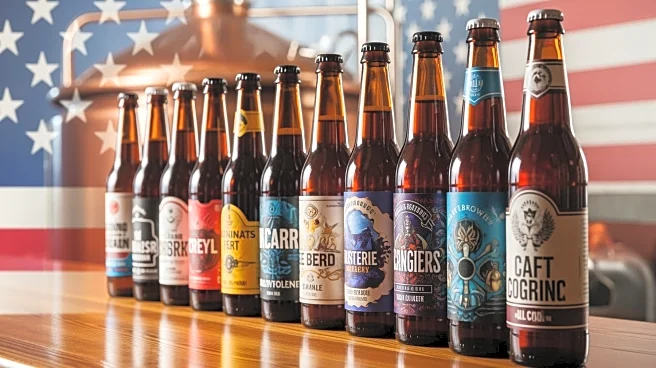What's Happening?
Research from the University of Illinois Urbana-Champaign suggests that President Trump's tariffs could significantly impact the $117 billion U.S. beer market. The study, led by agricultural economist Aaron Staples, indicates that while tariffs might
boost domestic beer production, the benefits would likely favor large multinational firms over small craft breweries. The beer industry is divided into craft beer, domestic noncraft beer, and imported beer. Tariffs can increase production costs and consumer prices, affecting purchasing behaviors. The study predicts that small businesses could lose market share due to higher proportional price increases compared to larger brands. The net reduction in consumer welfare could range from $53.1 million to $306.4 million, depending on the tariff structure.
Why It's Important?
The potential reshaping of the U.S. beer market due to tariffs has significant implications for various stakeholders. Multinational firms may gain market share, while small craft breweries could struggle with increased costs and reduced flexibility. This shift could affect local economies where craft breweries are integral. Additionally, tariffs on imported beer, particularly from Mexico, could lead to higher retail prices and reduced product variety. The broader impact includes potential changes in business strategies among multinational firms, emphasizing 'American made' products. The situation highlights the complex interplay between trade policies and domestic industries, with potential long-term effects on consumer prices and market dynamics.
What's Next?
The ongoing tariff situation remains fluid, with potential legal challenges to certain tariffs. As tariffs continue to affect production costs, businesses may initially absorb these costs but could eventually pass them on to consumers. This could lead to sustained higher prices for beer, impacting consumer choices and market competition. Craft brewers, operating on tighter margins, may face significant challenges, potentially affecting their survival and local economic contributions. The evolving landscape may prompt strategic shifts among multinational firms, including investments in production and marketing strategies. Stakeholders will need to monitor these developments closely as they navigate the changing market conditions.
Beyond the Headlines
The tariff-induced changes in the beer market could have broader cultural and economic implications. Craft breweries, often seen as cultural staples in local communities, may face existential threats, altering the social fabric and economic contributions of these businesses. The emphasis on 'American made' products by multinational firms could influence consumer perceptions and nationalistic sentiments. Additionally, the legal challenges to tariffs could set precedents for future trade policies, affecting industries beyond beer. The situation underscores the interconnectedness of global trade policies and domestic market dynamics, with potential ripple effects across various sectors.

















